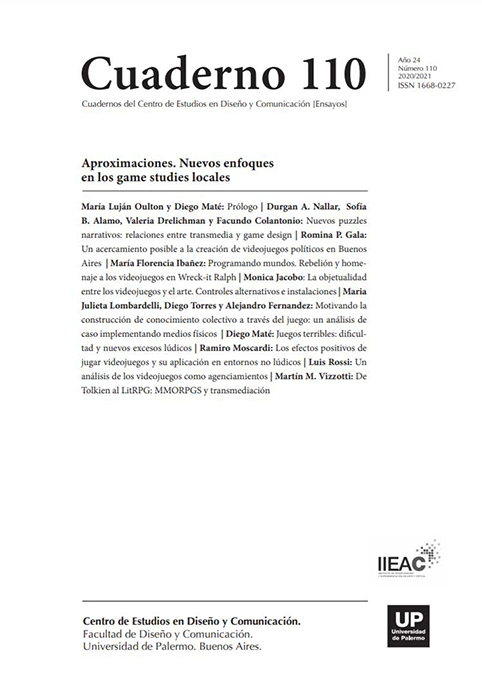Un análisis de los videojuegos como agenciamientos
Abstract
Recently several studies have explored the limits and possibilities of videogames as expression of globalized cultural industry but also as a resistance point to capitalism. However, these conceptualizations often omit fundamental features of videogames as apparatuses (dispositifs) or assemblages (agencements) of contemporary societies as well as their relations with modes of subjectification forged in engagement (refrain). Our proposal will recover the elements that allow videogames to be studied as condensation of sign regimes (images) and materialities by identifying the lines (molecular, molar and abstract) that compose (re/ territorialize) digital video game assemblages (intensive semiotics of spatiality, mechanics and gameplay), as well as their possible lines of flight (deterritorialization). Likewise, if our analytical model finds its theoretical foundations in French post-structuralism, this paper will rely on the main contributions of applied ludology. Therefore, our paper will present a empirical analysis (comparative grids) on a corpus of 45 developments produced between 2010 and 2016 in Global Game Jams of the city of Santa Fe.
References
Apperley, T. (2011). Gaming rhythms. Amsterdam: Institute of Network Cultures.
Bogost, I. (2006). Unit Operations. Cambridge: MIT Press.
Collins, K. (2013). Playing with sound. Cambridge: MIT Press.
Cremin, C. (2016). Exploring Videogames with Deleuze and Guattari. New York: Routledge.
Deleuze, G. (2008). Dos regímenes de Locos. Valencia: Pre-Textos.
Deleuze, G. y Guattari, F. (1997). Mil Mesetas. Valencia: Pre-Textos.
Dovey, J. y Kennedy, H. (2006). Games Cultures. Glasgow: Open University Press.
Dyer-Witheford, N. y de Peuter, G. (2009). Games of Empire. Minneapolis: UMP.
Eskelinen, M. (2012) Cybertext poetics. Londres: Bloomsbury Publishing.
Friedman, T. (2002). Civilization and Its Discontents. Smith, G. (Ed). On a Silver Platter. 132-150. New York: NUP.
Galloway, A. (2006). Gaming. Minneapolis:UMP.
Gazzard, A. (2009). Paths, players, places (tesis doctoral). University of Hertfordshire, Gran Bretaña.
Guevara-Villalobos, O. (2013). Cultural production and politics of the digital games industry (tesis doctoral). University of Edinburgh, Escocia.
Järvinen, A. (2008). Games Without Frontiers (tesis doctoral). Tampere University, Finlandia.
Meldgaard, B. (2011). Dangerous Forms (tesis doctoral). Aalborg University, Dinamarca.
Newman, J. (2004). Videogames. Londres: Routledge.
Nitsche, M. (2008). Video Game Spaces. Cambridge: MIT Press.
Papadopoulos, S. (2011). Urban landscapes in video games. Grecia, URL: http://www.arch.uth.gr/urbanlandscapesinvideogames.
Pedercini, P. (2014). Videogames and The Spirit of Capitalism (mensaje en blog). Molleindustria. Recuperado de http://www.molleindustria.org/blog/videogames-and-the-spiritof-capitalism/
Rossi, L. (2018a). Agenciamientos en las sociedades de control. CUHSO, 28(1), 177-206.
Rossi, L. (2018b). El modo de existencia de las imágenes a la luz de Simondon. Reflexiones Marginales, (48). Recuperado de: https://2018.reflexionesmarginales.com/el-modo-deexistencia-de-las-imagenes-a-la-luz-de-simondon/
Rossi, L. (2018c). Apuntes sobre algunas relaciones históricas entre juego y máquinas. Lúdicamente, 4(1).
Rossi, L. (2019).Videojuegos y sociedades de control: la formación del cognitariado en las Global Game Jams. Revista Crítica de Ciências Sociais, (118), 101-124.
Walz, S. (2010). Toward a Ludic Architecture. Pittsburgh: ETC Press. Videojuegos de la Global Game Jam de 2010 a 2016.
Recuperados de: https://globalgamejam.org/games
Deathception (2010)
Land the Mime (2010)
Board Extintion (2011)
Dino Slayer (2011)
Downgrade Complete (2011)
Extíngueme si puedes (2011)
Kill the ligths (2011)
Missing (2011)
The Entity (2011)
Virus Lothar (2011)
Apocalipsis (2012)
Banvet (2012)
Chicken Defense (2012)
ValleOuroboros (2012)
Elusive Spirit (2012)
Panic Snake (2012)
Spider Loop (2012)
Todajato (2012)
Taquicardia (2013)
Marcos Paso (2013)
Destaparterias (2013)
Insane Heart(2013)
Sheep Master (2013)
SuperPipeHeart (2013)
Doki Doki (2013)
ClarOscuro (2014)
L’Empire de la Mort (2014)
Monochrome (2014)
Safari Race (2014)
Schrödinger’s Maze (2014)
Egocentric (2014)
Sigilo (2014)
Batch Desesperation (2015)
Dolores (2015)
Jimmy, el chabón (2015)
Physikaos (2015)
Square Revenge (2015)
Traptest (2015)
The Dungeon of the lost children (2015)
Ritual Blood (2016)
Voodoo Cloud (2016)
The Ritual of Namaka (2016)
Timmy don´t sleep (2016)
Hellffort (2016)
Argieman Origins (2016
Los autores/as que publiquen en esta revista ceden los derechos de autor y de publicación a "Cuadernos del Centro de Estudios de Diseño y Comunicación", Aceptando el registro de su trabajo bajo una licencia de atribución de Creative Commons, que permite a terceros utilizar lo publicado siempre que de el crédito pertinente a los autores y a esta revista.


